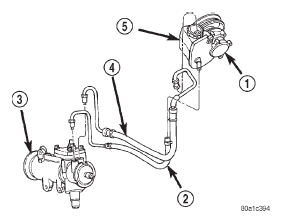Jeep Cherokee (XJ): Power steering
STEERING SYSTEM DESCRIPTION The power steering system has a hydraulic pump.
The pump is a constant flow rate and displacement,
vane-type pump. The pump on the 4.0L engine has a
reservoir mounted to it (Fig. 1). The 2.5L engine has
a remote mounted reservoir.
The steering gear (Fig. 1) used is a recirculating
ball type gear with 14:1 gear ratio. A tilt and non-tilt
column provide steering input.
NOTE: Right hand drive (RHD) and left hand drive
(LHD) service procedures and torque specifications
for steering linkage, gear and column are the same.
The power steering pump procedures are different.
Refer to appropriate service procedures regarding
each component in the system. OPERATION The steering gear acts as a rolling thread between
the worm shaft and the rack piston. Power assist is
provided by the hydraulic pump. When the steering
wheel is turned the worm shaft turns which moves
the rack piston. The rack piston movement turns the
pitman shaft which is connected to the steering linkage
by the pitman arm.
1 - 4.0 L PUMP POWER STEERING SYSTEM DIAGNOSIS CHARTS STEERING NOISE There is some noise in all power steering systems. One of the most common is
a hissing sound evident at a
standstill parking. Or when the steering wheel is at the end of it's travel.
Hiss is a high frequency noise similar
to that of a water tap being closed slowly. The noise is present in all valves
that have a high velocity fluid passing
through an orifice. There is no relationship between this noise and steering
performance. CONDITION POSSIBLE CAUSES CORRECTION INSUFFICIENT ASSIST OR POOR RETURN TO CENTER CONDITION POSSIBLE CAUSE CORRECTION Some roads will cause a vehicle to drift, due to the
crown in the road. LOOSE STEERING AND VEHICLE LEADS/DRIFTS CONDITION POSSIBLE CAUSE CORRECTIONDescription and operation

Fig. 1 Power Steering Gear & Pump - 4.0L
2 - RETURN HOSE
3 - STEERING GEAR
4 - PRESSURE HOSE
5 - RESERVOIRDiagnosis and testing
OBJECTIONAL HISS OR
WHISTLE
RATTLE OR CLUNK
CHIRP OR SQUEAL
WHINE OR GROWL
SUCKING AIR SOUND
SCRUBBING OR
KNOCKING
DIFFICULT TO TURN WHEEL
STICKS OR BINDS
HARD TURNING OR MOMENTARY
INCREASE IN TURNING EFFORT
STEERING WHEEL
DOES NOT WANT TO RETURN TO
CENTER POSITION
EXCESSIVE PLAY IN STEERING
WHEEL
VEHICLE PULLS TO ONE SIDE
DURING BRAKING
VEHICLE LEADS OR DRIFTS
FROM STRAIGHT AHEAD
DIRECTION ON UNCROWNED
ROAD.
Other materials:
Instrument panel cigar lighter. Cigar lighter relay. Instrument panel power outlet
Instrument panel cigar lighter
For complete circuit diagrams, refer to Horn/Cigar
Lighter in the Contents of Group 8W - Wiring
Diagrams.
WARNING: ON VEHICLES EQUIPPED WITH AIRBAGS,
REFER TO GROUP 8M - PASSIVE
RESTRAINT SYSTEMS BEFORE ATTEMPTING ANY
STEERING WHEEL, STEERING COLUMN, OR
INSTRUME ...


